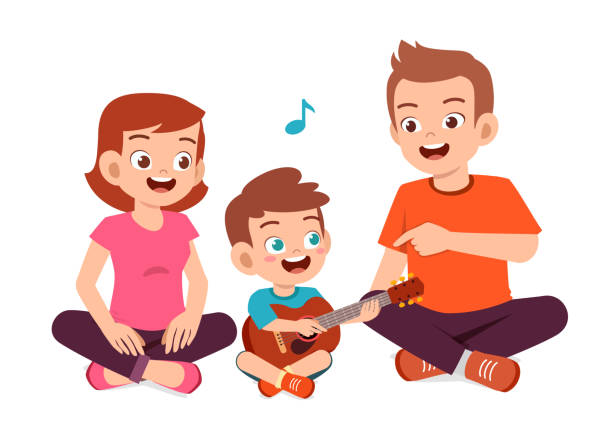Table of Contents
Early childhood is a period for playing, singing, and having a good time. Children can do this much better than adults, who are often concerned with other people’s perceptions or take life a little too seriously. Wanna know about the 5 benefits of singing with your child? Go on reading till the end.
Singing is one of the soundest activities for children, and all children are drawn to it by their natural desire to create, discover, and play.

But singing songs isn’t just for entertainment. Singing benefits a child’s development in various ways, and music is especially important in the early years.
Music is integrated into every preschool lesson plan and encouraged from infancy. So, how does singing with children help? Here are some of the advantages of singing in childhood.
5 benefits of singing with your child: Why is singing with children important?
A lot happens in their brain when a child hears music, plays a musical instrument, hums a tune, or sings a song. Children who learn to play music develop important motor skills. They realize to focus, listen carefully, and repeat what they hear when singing. Singing songs with your child, like reading to them, helps to improve their vocabulary and language skills. Singing songs helps children recognize different sounds within words. And this newfound ability will help young children sound out written words as they learn to read.
Singing allows a child to express their emotions and improves their communication skills while exercising their lip and tongue movements. However, one of the significant advantages of singing is the repeated use of the memory muscle.
Learning a piece of information while listening to a song helps that information stick in a child’s mind faster. Most children learn the alphabet by singing rather than saying the letters. This is one of the 5 benefits of singing with your child.
What are the major 5 benefits of singing with your child?
Singing is a lovely pastime. Listening to your child sing is one of the most beautiful sounds you’ll ever hear. Singing in early childhood has several advantages. Giving them the right training from the start can help them advance in the long run. The best time to learn to sing is when you are young. So, introduce your child to the wonderful world of music! Singing, aside from being a fun activity, has numerous advantages. Here are the 5 benefits of singing with your child:
5 benefits of singing with your child: Benefit One: Aids in Brain Development
Singing is one activity that stimulates different parts of your brain. This activity affects fine motor skills, visual imagery, language, and emotions. Singing also entails remembering the lyrics, reciting the song, and knowing when to begin the song. All of this helps a child’s concentration skills. Singing has also been shown to boost your child’s imagination and creativity.
Furthermore, scientific studies show that singing can help improve brain plasticity or neuroplasticity. It refers to the mind’s ability to learn new things. Singing can also be therapeutic, so engaging your child in some much-needed singing activities is the best way to help them de-stress.
5 benefits of singing with your child: Benefit Two: Enhances Communication Skills
Don’t be surprised if your child can sing before she can talk. Because music is catchy, singing is much easier than talking. This activity has also been shown to help improve communication skills. Singing teaches children how to string words and sounds together to form a sentence. They also learn how to communicate.
They learn to listen to the people around them and express their feelings and emotions, which is an important part of communication, and listening to the different beats and sounds of music can help them do just that. Before singing, you must also listen to the music, pitch, and tones. It improves the child’s listening capacity and ability.
5 benefits of singing with your child: Benefit Three: Enhances Respiratory and Cardiac Function
Did you know that singing is an anaerobic activity? This implies that it helps to improve the cardiovascular system. Singing helps to increase alertness and concentration, as does any aerobic exercise after blood oxygenation. Singing improves thoracic activity, which aids and enhances several breathing mechanisms in the respiratory system.
A considerable number of muscles in the upper body are also exercised. Finally, because there is a much better flow of air, singing can reduce the flourishing of bacteria in the upper respiratory tract. Singing is also an excellent stress reliever.
5 benefits of singing with your child: Benefit Four: Enhances Cognitive Processes
Cognition refers to the processes of thinking. Singing can help your child’s cognitive processes because she is constantly thinking about what notes to hit when to sing forth and the various musical sounds that come with this activity.
When your child hears a familiar song, he or she recalls several things, including where they had heard the song, the lyrics, and the associated dance steps. Thinking, in turn, aids in mental processes and brain development.
5 benefits of singing with your child: Benefit Five: Improves Self-Confidence
Sometimes just learning a new song is enough therapy. Knowing that she can sing can give a child a sense of accomplishment and pride. Singing is also a talent. When your child discovers that they have the ability to sing, she gains confidence.
Singing is a fun activity that gives kids a sense of accomplishment. Because it is difficult to “do it wrong,” children perceive the activity as successful.
Young children require validation and the assurance that they are capable. Any activity in which a child feels she has succeeded boosts her self-esteem.
Singing also teaches children to use their voices, be heard, and express themselves, boosting confidence. A child who is singing is heard and recognized.
Also Read: 5+ Best Toddler Shoes And How To Pick The Perfect One
Other benefits besides the major 5 benefits of singing with your child
Increase of vocabulary
Singing songs is an excellent way for young children to expand their vocabulary.
Through songs, children are exposed to a wide range of vocabulary and topics, much of which they may not listen to in everyday interactions with others.
Even babies who do not yet understand words benefit from listening to songs because they gradually pick up the sounds of their mother tongue and someday learn to distinguish the words and phrases.
Research says children who listen to stories and sing songs and rhymes have a much larger vocabulary than those who do not.
Enhances language learning
Children learn the entire language structure from singing, not just words.
Children are introduced to a language’s grammar, sentence structure, and word order.
They also understand the different parts of speech, such as descriptive language (adjectives) and action words (verbs).
Introducing Concepts for Teaching
Songs can be a wonderful method to introduce new concepts or topics to children, such as using number songs to help children understand the concept of numbers that increase or decrease in order.
Songs, such as ocean songs or animal songs, can be used to share knowledge and concepts related to your preschool themes.
Improves health and well-being
Songs can be beneficial to both a child’s physical and emotional development.
Singing has physiological benefits for children, according to research. Singing strengthens the respiratory muscles and improves breathing. It energizes and gives you a good workout.
It also causes hormonal changes, regulating oxytocin, immunoglobulin A, and endorphins, which improves immune system function and increases happiness in children.
Improves Listening Skills
Song learning is an excellent listening activity. During a movement song, such as “If you’re happy and you know it,” children must listen for and perform the actions.
They also listen to the song’s lyrics or anticipate when the chorus will begin so they can join in.
All of these activities aid in developing listening skills, which are essential for academic success and good reading skills. It also aids in the development of their attention span.
Enhances Auditory Memory
Listening to song lyrics and learning to sing them helps a child’s auditory memory.
Young toddlers begin by remembering simple lyrics like “twinkle, twinkle, little star,” but with time and practice, they learn to memorize longer, more complex verses.
Memory is an important skill for learning to read, and it can be easily developed through songs, rhymes, listening activities, and memory games.
Helps in Sequencing
Children must not only learn to recognize what they hear but also recall it in the correct order. It is also part of the procedure of learning to read.
Children are exposed to sequences through songs, such as numerals increasing or decreasing in a piece of counting music or singing about a sequence of events.
Here are a few songs that contain a sequence of events:
- Miss Polly had a dolly
- Five little ducks
- This little piggy
- Head, shoulders, knees, and toes
- The ants go marching
- This old man
They frequently have to memorize a series of actions that aren’t always in a logical order, such as in the song “We’re going on a bear hunt” or “If you’re happy and you know it.” This aids in the development of sequential memory.
Sound Patterns and Rhyming
Understanding sounds and hearing sounds in words is the foundation of learning to read and spell – this is a characteristic of a child’s auditory perception.
A young baby’s ears are trained over time to hear the sounds of his language.
When they are older, they can decode sound by combining it with visual representations of sound (letters and words).
This makes singing an excellent pre-reading activity because when you teach your children songs, they develop a perception of sounds.
Songs with rhyming, nonsense, and repetitive words are especially effective for this.
Children learn to hear patterns by being exposed to rhyming words, which they will use when reading.
5 benefits of singing with your child: 3 Tips for Singing
- Sing Without Using Words
Sing songs to your child that have no words or lyrics. You can sing familiar songs by singing the melody and replacing the words with a repeated vocal syllable (such as ‘la la la la’). You can hum the melody without using a vocal syllable, but doing so allows you to better express the melody’s rhythm and phrasing.
When you sing without the words, you encourage your child to focus on the music rather than the language of the song.
- Interact and imitate
You can encourage your child to sing and interact musically with you at a young age by imitating their natural vocal sounds, adding short bits of singing, and pausing to let them respond, engaging them in ‘call and response’ singing.
You can encourage older children and toddlers to sing and interact by singing short phrases and then prompting them with smiles and positive encouragement such as “ok, now your turn.” Even if your child does not respond, you can keep singing and giving them the opportunity as part of your daily life, and most kids will eventually join in.
- Attempt Not to Correct
Rather than correcting your child’s singing, encourage him or her to sing freely and creatively.
During your child’s infant and toddler years, they will be unaware that their singing differs significantly from other people’s singing or that they are singing ‘incorrectly,’ so encourage them to sing in whatever way comes naturally to them.
Takeaway
Singing is the type of activity that can be used in a variety of beneficial ways and contexts. Signing with your children is highly beneficial for them!
Consider the role of singing to calm active children or when singing nursery rhymes to help children fall asleep at night.
Music can also improve mood and encourage children to be more active and involved, such as when singing a movement song.
Do you need to get your kids to clean up? Sing some upbeat songs. What about teaching them how to properly wash their hands? Make use of a hand-washing song!
You can incorporate singing into your child’s routine by incorporating it into a game or activity that your child will enjoy.
You can play a game in which the child must repeat the musical sounds you make. You can also choose a song for your child to learn each week.
Singing with your child, as you can see, is about much more than just having fun!
Keep this skill alive by teaching it to your children! Make it a point to incorporate singing into your child’s daily routine. They will enjoy it in the long run.















